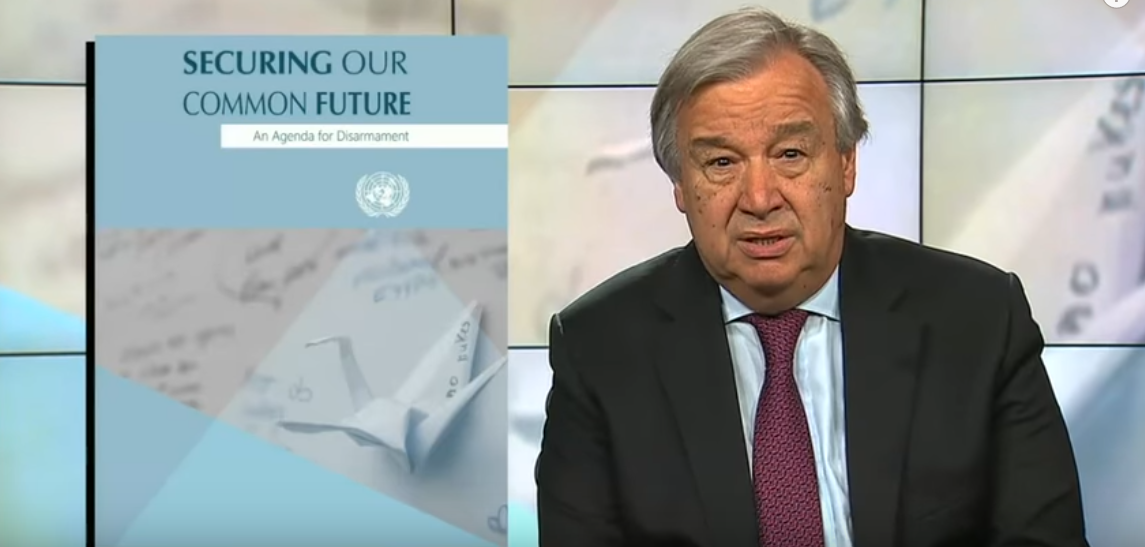On 24 May 2018 (International Women’s Day for Peace and Disarmament), United Nations Secretary-General António Guterres launched Securing Our Common Future: A Disarmament Agenda, which outlines a set of practical measures across the entire range of disarmament issues, including weapons of mass destruction, conventional arms and future weapon technologies. In addition to providing an overview of disarmament objectives, Securing our Common Future explores the political and security contexts which give rise to weaponization, arms races and armed conflict, and places disarmament into the framework of the work of the United Nations on peacekeeping, peacebuilding and sustainable development.
In commemoration of 24 May 2020, and taking into consideration the implications of the COVID-19 pandemic and other relevant political developments, UN High Representative for Disarmament Affairs Ms Izumi Nakamitsu released a message on the status of the agenda, the Journal for Peace and Disarmament published an in-depth analysis of the Disarmament Agenda by Randy Rydell, and an international Women’s Appeal for Human Security, public health, peace and sustainable development was released by Parliamentarians for Nuclear Non-proliferation and Disarmament, Women Legislator’s Lobby and the World Future Council.
UN High Representative message on the UN Disarmament Agenda
Ms Nakamitsu’s message on 27 May 2020 reports positively on the strong support given to Securing Our Common Future from UN Member States, especially the 20 countries that have stepped forward as Champions and Supporters for the Agenda’s implementation plan. She also notes that ‘The unprecedented crisis that is gripping the entire planet underscores the critical importance of this Agenda.’ However, she laments the fact that the tools of disarmament remain ‘underutilized’ as weapons continue to proliferate and impact negatively on communities and international security.
‘The international arms control architecture continues to be eroded as tensions among major powers increase. The use of explosive weapons in populated areas has left healthcare systems of entire societies bereft of the means to combat the pandemic. Global military spending reached record highs this year, as governments face an urgent need to redirect resources to economic recovery and effective job creation.’
Ms Izumi Nakamitsu – UN High Representative for Disarmament Affairs, 27 May 2020.
The Guterres Disarmament Agenda and the Challenge of Constructing a Global Regime for Weapons
In this article published on 27 May 2020, Randy Rydell, Executive Advisor of Mayors for Peace and retired Senior Political Affairs Officer of the United Nations Office for Disarmament Affairs, outlines key points and innovations of the UNSG’s disarmament agenda, examines how the agenda has been received at the United Nations and by governments and civil society, explores the key obstacles the plan is facing and suggests some initiatives that would serve to broaden support for the agenda.
Key innovations in the agenda that Rydell highlights are the strong connections that it makes between disarmament and the fields of peacekeeping, conflict mediation and prevention, and also the strong connections it makes between disarmament and sustainable development, including to at least 10 of the Sustainable Development Goals.
By making these connections explicit, the agenda provides an impetus for incorporating disarmament into the work of UN agencies engaged in peacekeeping and sustainable development in addition to those already working on disarmament. In addition, by making these connections the UN Disarmament Agenda provides stimulus to enhanced cooperation between NGOs working on disarmament and those working on peace and sustainable development issues. However, Rydell expresses concern that such a broadening of disarmament action and engagement of peace and SDG sectors is not yet emerging.
‘Is disarmament turning up in publications or web sites in the UN system dealing with sustainable development, humanitarian or human rights issues, international law, the environment, gender issues, child welfare, and peacebuilding activities? While there is little evidence so far that this is occurring on any significant scale, this too will be an important future indicator of the impact of the agenda on the UN’s own organization.’
Randy Rydell, The Guterres Disarmament Agenda, Page 11
Rydell highlights two key aspects of the UN Disarmament Agenda that, while not as innovative, have implications for national and international security planning that have yet to be realised. These are the relationships between defence and human security, and the goal of disarmament to support both national and human security.
‘Today, it is well understood that our concept of security must ensure the protection not only of the State, but of its human population as well. In the 21st Century, mutually reinforcing notions of human and national security guide our efforts to further develop multilateral and collective security institutions… Disarmament is a central means for addressing today’s sources of insecurity and violence. Disarmament is at the heart of the system of collective security set out in the United Nations Charter. It is a tool to help prevent armed conflict and to mitigate its impacts when it occurs and an essential tool to secure our world and our future.’
Randy Rydell, The Guterres Disarmament Agenda, Pages 6 and 7
Rydell also notes that Guterres was the first Secretary-General to emphasize the specific relevance of disarmament to cities. He cites the report’s observation that ‘What these complex [armed] conflicts have in common is their increasingly urban nature, the massive loss of civilian life and the destruction of civilian infrastructure… As armed conflict has moved from open fields and into villages, towns and cities, the humanitarian impact has been devastating.’ (Rydell, page 5). According to Rydell this highlights the importance of engaging cities and metropolitan legislators (mayors and councillors) in disarmament. However, unlike in other key issues such as climate change, metropolitan legislators are not yet engaged effectively in UN disarmament processes. This is an area for improvement, and Rydell makes a number of recommendations along these lines (See Table 2.: Practical actions for the UN and mayors to advance “Disarmament and Cities”, Rydell page 16).
Women’s appeal for human security, peace and sustainable development
On May 24, International Women’s Day for Peace and Disarmament, a women leaders appeal Human security for public health, peace and sustainable development was publicly released and sent to Heads of State, UN leaders and national ambassadors to the UN. The appeal, which promotes UN processes and initiatives for peace and disarmament, was endorsed by over 250 women legislators, religious leaders, former high-level UN officials, and leaders of civil society organisations from 50 countries.
‘This year we commemorate the 20th anniversary of UN Security Council Resolution 1325,’ said Maria Fernanda Espinosa (Ecuador), President of the 73rd UN General Assembly and one of the endorsers. ‘Today, in the midst of the COVID-19 pandemic, the role of women in the prevention and conflict resolution, peace negotiations, peace-building, peacekeeping, humanitarian response and in post-conflict reconstruction is more important than ever. Women are not only victims of armed conflict and violence but they can and should be leading the efforts in peace and security.’
“We welcome Securing Our Common Future, the Disarmament Agenda launched by United Nations Secretary-General (UNSG) in 2018,’ said Hon. Daisy Lilián Tourné Valdez (Uruguay), President of the Parliamentary Forum Small Arms and Light Weapons, ‘and we call for warring parties around the world to agree to the UNSG´s appeal of March 2020 for a global ceasefire to help combat the Coronavirus pandemic. It should be accompanied with significant cuts in the production and trade of conventional weapons and small arms, with the goal of achieving sustainable world peace and reducing violence.”
‘Poverty and pandemics cannot be eradicated with nuclear weapons and war,’ said Mairead Maguire (Northern Ireland), Nobel Peace Laureate (1976). ‘We all must cooperate to ensure we co-exist and survive as the human species at one with ourselves, nature and a new earth.’
Click here for the full press release.

